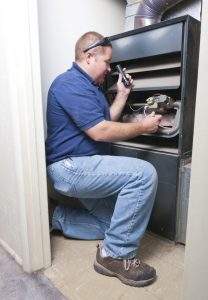 The East Coast was hit with freezing temperatures and blizzard conditions late last week, and we’re all still assessing the damage. When it comes to your furnace, any damage should be carefully assessed and immediately repaired. It can be tempting to try to “power through” any damage — winter isn’t going to get any gentler anytime soon — but that’s usually a big mistake. And in the case of a cracked heat exchanger, an immediate heater replacement session may be in order. To do otherwise risks more than a chilly home.
The East Coast was hit with freezing temperatures and blizzard conditions late last week, and we’re all still assessing the damage. When it comes to your furnace, any damage should be carefully assessed and immediately repaired. It can be tempting to try to “power through” any damage — winter isn’t going to get any gentler anytime soon — but that’s usually a big mistake. And in the case of a cracked heat exchanger, an immediate heater replacement session may be in order. To do otherwise risks more than a chilly home.
What is a heat exchanger and why is damage to it so devastating? We’ve prepared a quick summary below.
How It Works
Forced-air furnaces rely on burners to heat the air: fueled by natural gas and lit when you turn the heater on. But burners can’t warm the air very effectively. They simply provide the heat, which can be wasted if it’s not applied in the right way. That’s where the heat exchanger comes in. It’s essentially just a shaped piece of metal, designed to distribute the burners’ heat reliably and evenly to the air (which is then blown into your house with a fan).
Furthermore, heat exchangers are designed to safely filter out toxic gasses created as a by-product of the burners, then channel them to a vent and out of your home. That provides a vital safety feature as well as ensuring that your system is affected.
What Happens When It Breaks?
Heat exchangers have no moving parts and the metal is designed to last for many years without a problem. But the constant stress of the metal heating up and cooling down can take its toll, especially in older furnaces where the warranty has expired and the system has had to handle New England winters for many years in a row. (If you have an older furnace, you should pay close attention to it for any problems.)
When cracks arise in it, or more substantial damage takes place, it creates huge problems for the system. In the first place, much of its efficiency can be lost: sending your monthly rates skyrocketing and seriously damaging the furnace’s ability to get the home warm.
Even more importantly, the cracks mean that toxic gasses can escape into your home and create a serious health hazard. Gas detection devices can warn of the danger if properly installed, and many furnaces have automatic shut-down features that will turn the furnace off rather than risk spreading toxins (as well as alerting you to the problem), but that still leaves you without a functioning system to keep your home warm. The bad news is that a cracked heat exchanger usually isn’t worth the cost of repairs, and the money would be far better spent replacing it with a new system. The good news is that now is the perfect time to do that, in anticipation of more cold weather to come.
For heater issues of all varieties in your Boston, MA home, call Cooling Unlimited today!

